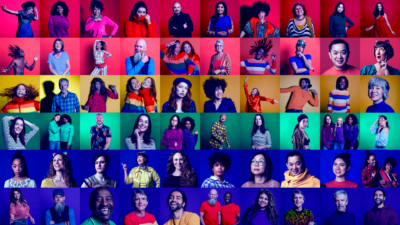How we can make cities more sustainable – a podcast episode about smart cities
Making cities greener, rethinking mobility, using energy cleverly and involving as many citizens as possible in democratic processes – smart cities encompass many aspects of urban space. In the 7th episode of our podcast with Flurina Wäspi, we talk about what sustainability and democracy have to do with this and how radical innovations are advancing the process.
Flurina Wäspi teaches and conducts research as a political scientist at the Institute Public Sector Transformation at BFH Wirtschaft. She studies how digital transformation becomes sustainable as well as digital democracy and participation. Click here for the podcast and an abridged version of the conversation.
Smart City actually means smart city and many people might first think of mobility solutions like Publibike. What is a smart city from a researcher’s point of view? E-mobility solutions are a big trend that moves many cities. Mobility is an easy entry point to the topic of smart city. From a researcher’s point of view, transport is also part of a smart city. We use the concept of the Smart City Wheel for this. This is a circle in which different pieces of the pie represent what, everything belongs to it. Smart Mobility is one piece of it. It also includes energy, the environment, our social life together and how to deal with authorities.
So a smart city needs a cultural change on many levels and innovation. Your institute is the new head of the Innovation Booster for Swiss Cities, what exactly is that?

Flurina Wäspi is a research associate at the Institute Public Sector Transformation.
This is a recent funding programme of Innosuisse, the Swiss Innovation Agency. Inno-Boosters is a programme in which Innosuisse hands over funding to a consortium that awards it to projects on a proxy basis. You have to apply for the funding. We are looking for innovative ideas, projects that have a completely new approach. In short: Innosuisse wants to promote radical innovation. And we at the BFH are currently the leading house.
What would be an example of radical innovation?
The idea of radical is that it is completely transformative, that it actually brings about very fundamental changes, not incremental changes. For example, radical would be: nobody uses a car anymore, everybody just uses the train or a completely new mode of transport. The invention of the iPhone was a radical innovation because it changed everything: how we shop and how we communicate. But whether an innovation is radical, you might not be able to judge at the beginning. We assess whether an idea has radical potential and are not so strict in our selection.
That sounds like a playground for start-ups. Who else can apply for funding?
There is no defined target group. The aim is to support projects that cannot find funding elsewhere. These can also be projects that do not find a source of funding on the market. It would be good if the innovation teams already have a stable partner who can secure further funding when our funding comes to an end.
The authorities could also use some radical innovation. Many people would like to see many more administrative procedures that could be done digitally. Would you welcome such a project?
Definitely, yes. I think electronic identity, which you also mention a bit, is not something that we are necessarily promoting through our booster, because it is a solution that is already being discussed and where it has simply not worked out politically in Switzerland so far. But a solution like that should come our way in the next few months. So I don’t think that’s our priority right now, but as you also mentioned, to promote innovation or ideas that simplify and change citizens’ access to the state in a positive way.
You also do research on digital sustainability. What aspects flow into that?
I’m talking more about sustainable digitalisation and dealing with the question: how do we shape our digital world, how do we use our digital devices in such a way that they don’t harm the environment more than they help it? At the moment, consumption is a very big challenge. According to one statistic, everyone on earth owns eight digital devices. That is of course an enormous challenge, especially when we talk about smart cities, where many things are controlled by sensors. We should ask ourselves from the outset what we do with these sensors, how we recycle them and what we do when they have reached the end of their life The rebound effect is then important. This means that digital devices are used to become more sustainable, but the devices themselves are produced with a large consumption of resources, which cancels out the positive effects.
Would it be a radical innovation to develop labels for digital devices so that consumers know whether the device was produced sustainably?
At the European level, the “product passport” is being discussed. The EU is often a bit more progressive than we are here in Switzerland. This is a passport that says where I come from, what my name is, what my size is, where I was produced. In principle, in the future we could look up for every computer where these parts come from, what I do with them when they break, where can I recycle them. In this way, consumers can make more sustainable purchasing decisions. For me, the purchase is the most important moment. Radical would be if you decide that you simply don’t buy any new devices at all. Instead, you can buy refurbished equipment at Revendo in Bern or Back Market in Germany, for example.
This is a shortened version, you can hear the whole conversation in the podcast. All episodes of Let’s Talk Business can be found on the BFH Wirtschaft website and also on Spotify, Deezer and Google Podcast.
Further links to the episode
– Swiss Smart Cities Ideas Platform NTN Innovation Booster
– Inoville: Smart models for strategy and management processes in the municipality of tomorrow
– Smart City Strategy of the City of Vienna
This podcast is produced with the kind support of: Audioflair Bern and Podcastschmiede Winterthur.
 Create PDF
Create PDF








 Contributions as RSS
Contributions as RSS
Leave a Reply
Want to join the discussion?Feel free to contribute!